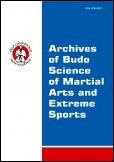2018, Volume 14, Issue 1
Body composition characteristics vs a subjective assessment of body mass and eating habits by female wrestlers using the example of the Polish national youth team
Paweł Piepiora1, Magdalena Superson1, Kazimierz Witkowski1, Jarosław Maśliński1, Juliusz Migasiewicz1
1Faculty of Sports Sciences, University School of Physical Education in Wrocław, Wrocław, Poland
Author for correspondence: Paweł Piepiora; Faculty of Sports Sciences, University School of Physical Education in Wrocław, Wrocław, Poland; email: pawel.piepiora@awf.wroc.pl
Full text
Abstract
Background & Study Aim: Controlling the body mass in long-term carteer of combat sports athletes is one of the most important health strategies. The aim of the study was the relationship between body weight and body fat level and correlation of body mass and composition with the subjective assessment of body weight and eating habits of the wrestlers.
Material & Methods: The mass measurement and body composition analysis were performed using the TANITA BC-418MA analyzer. Fifteen female athletes from Poland's inventory of 20.26 ±1.43 years of age participated in the study, with body weight 61.75 ±8.10 kg, body fat 18.36 ±5.07%. The assessment of the subjective assessment of body weight and eating habits was made on the basis of a questionnaire.
Results: Strong, positive correlation between the level of body fat (%) and body weight (kg), (R Spearman = 0.8, , t(n − 2) = 4.81, p = 0.0003). Lack of connection between body composition and subjective assessment of body weight, training experience and compliance with specific nutritional rules by the tested female athletes.
Conclusions: The wrestlers with a higher body weight are also characterized by a higher (%) level of body fat. The inter-individual comparison of the level of muscle mass measured in kg and adipose tissue measured kg is not justified in disciplines in which weight categories exist. In contrast, the percentage of body fat should remain at a similar level regardless of the current weight category. Increasing the level of fatness does not contribute to the improvement of motor skills important in wrestling. At the same time, the study did not show the relationship between body composition and compliance with specific nutritional principles and subjective assessment of body weight. Therefore, it is likely that the behaviour of lower body fat level is affected by behaviours that athletes do not perceive as conscious compliance with nutritional principles.
Key words: adipose tissue, dietetics, nutrition, psychodietetics





